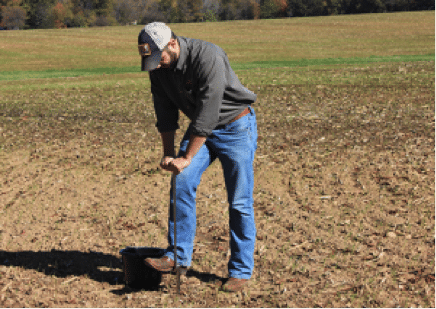Responsible Nutrient Management
Protecting our water and soil while increasing yields
Fertilizer and the Environment: What’s the Connection?
Plants need nutrients to grow and soil needs nutrients to be productive, however excess nutrient use has had serious consequences for our water, soil, and our health. Farmers and planters can help to prevent these issues through responsible nutrient management, and they can actually improve yield at the same time.
The application of fertilizer seems pretty straightforward at first glance; apply fertilizer to the soil and crops will use them. However, we now know that using excess nutrients can have disastrous effects on the environment, and even cause health issues in our communities.
Fertilizers, like everything in the world, are made up of elements and compounds. When applying the right amounts and types of these elements and compounds, plants get what they need to thrive. However, these elements and compounds don’t always go to the plants. The nitrogen, phosphorus, potassium, and micronutrients farmers use to restore the soil sometimes accumulate there, and other times travel into waterways or drinking water through runoff. While small amounts of these nutrients are vital, too much can quickly become harmful.
This is why responsible nutrient management is so important. Adding too much fertilizer means plants take only what they need, and the rest goes into our rivers, lakes, wells and homes.
Effects of Excess Nutrients
- Soil salinization and soil quality reduction
- Loss of soil microorganisms and soil health
- Death of aquatic plants and animals through nutrient pollution
- Growth of harmful algal blooms and aquatic dead zones through nutrient pollution near fishing areas
- Toxic algal blooms and poisoned drinking water through excess Nitrogen and Phosphorus near reservoirs
- Cancer, infant brain damage, and blue baby syndrome caused by nutrient contamination in groundwater
How Does AgroLiquid Help with Responsible Nutrient Management?
Responsible nutrient management does not mean giving your crops less nutrients, but simply ensuring that the nutrients are actually used by the crops, so they don’t later travel to the water or get left behind in the soil. The efficient use of nutrients in fertilizers is what our high-efficiency fertilizer is based on. Our liquid fertilizers are formulated to be digested by plants more easily, and to resist contaminating water and soil.
How does it work?
Have us design a custom responsible nutrient plan
Different soil types, crops, weather conditions and other factors all play a role in the nutrient profile of your soil and what types of fertilizer your crops need to thrive. Our agronomists will perform a soil analysis to determine what types of nutrients your crops need, and give you a custom nutrition plan to boost yield while practicing responsible nutrient management.

Are you a responsible farmer or grower?
The Responsible Nutrient Management Practitioners Program recognizes no-till farmers who are dedicated to environmental stewardship as well as productive farming. If you are no-till farmer protecting the health of the land, or you know someone who does, we invite you to submit a nomination.
These practitioners incorporate the most efficient cultural activities and use nutrition products to positively impact soil fertility, water quality, fuel efficiency and sustainable productivity. Three no-tillers are honored at the National No-Tillage Conference each year to recognize their exceptional efforts.
Be a part of the solution
If you want to do your part to protect your home and surrounding environment, we want to help. Talk to one of our experts to learn more about high-efficiency fertilizer for your crops, and see how liquid fertilizer can dramatically reduce agricultural pollutants.

